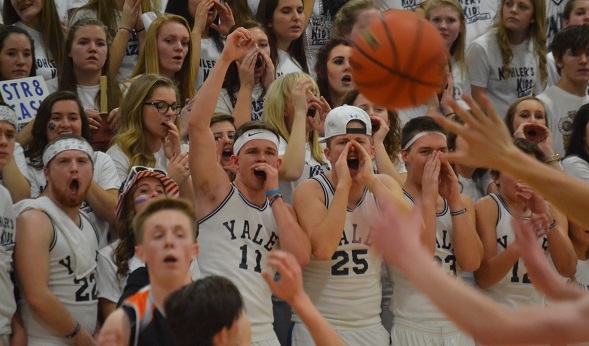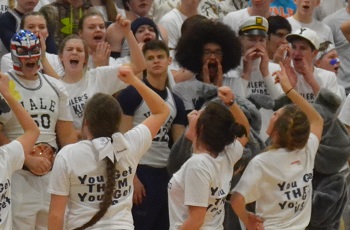
'Reloaded' Yale Section Brings Noise Again
January 19, 2016
By Geoff Kimmerly
Second Half editor
YALE – For eight years, Yale’s student section has borne his name – out of respect and also a desire to emulate the intensity of the leader of one of the school’s most successful teams.
Bulldogs boys basketball coach Garnett Kohler has made sure the leaders of “Kohler’s Kids” know he wants the section to be their thing and its direction based on their decisions.
But he’s also made it known he – like many in the community – is a fan of theirs as well.
“He pulled me aside and said he heard I was one of the leaders this year. He said, ‘I wanted you to know you’re part of the basketball family this year, and you’ve got to represent well,’” senior Austin Mabry said. “It was a lot to take in.”
And also recognition for what Kohler’s Kids have become, especially over the last two seasons, as supporters and homecourt advantage providers for the school’s boys basketball team.
Yale’s student section is in the running again to become known as Michigan’s top high school student section as the lone returning finalist for this season’s Battle of the Fans V. The MHSAA kicked off its finalists tour Friday with Yale’s boys basketball game against Armada. Visits are scheduled over the next month to Muskegon Western Michigan Christian, Traverse City West, Munising and Charlotte leading up to the naming of this year’s champion Feb. 19. The public may vote for its favorite on the MHSAA’s Facebook, Twitter and Instagram sites beginning Feb. 16, with the MHSAA Student Advisory Council taking that vote into consideration when selecting the champion after that vote has concluded.
Roughly 400 students including a few rows of middle schoolers filled a quarter of Yale’s gym Friday night, similar to last year’s BOTF visit – but also with a few key differences.
First, the section’s got a new name, as is tradition (as long as Kohler’s is part of it). But this name actually is an old one. Yale’s students took on the name Kohler’s Kids when the coach was hired in 2010, then evolved to Kohler’s Krew and Kohler’s Krazies last year before returning to their roots this season as Kohler’s Kids Reloaded.
Most noticeably, the section now includes a band – and not just a small group of pep players filling in. Roughly 50 band members anchored the edge of the section, providing another layer of sound to the roar that’s become synonymous with Kohler’s Krew/Krazies/Kids – and earned them mention with a “Bring the Noise Award” during Battle of the Fans IV.
They’ve been bringing the noise on social media like never before as well. On Twitter, @yalesquad has become the mode of communication not just to announce theme nights as in past years, but also as the main way to keep the large following revved and in line – not the easiest task when trying to point a few hundred classmates in the same direction.
 Also different: Leadership. The group running the show this season is almost entirely different than a large group of mostly now-graduates who put Yale’s section on the cheering map last winter – and that effective passing of the reins will continue to benefit the section for years to come.
Also different: Leadership. The group running the show this season is almost entirely different than a large group of mostly now-graduates who put Yale’s section on the cheering map last winter – and that effective passing of the reins will continue to benefit the section for years to come.
The six leaders this winter also are athletes – four play football, a few play baseball, one plays volleyball and another golf. Senior Rachel Stawecki was part of the main leadership group last year and is joined by Mabry, seniors Joey Moza and Kyle Avery and juniors Brett Bollaert and Emily Kaatz. They’ve all been part of the big push over the last three years to make the section more than the informal group of upperclassmen that comprised the earlier versions, along the way earning their move into the front row of the bleachers.
Theirs is an enviable position and now comes with a succession plan, as seniors “will” leadership of the section to those expected to follow. But it’s more than that. This year’s leaders continue also-enviable strong relationships with principal Paul Flynn and athletic director Maureen Klocke that go a long way toward ensuring the section will have its current freedom in the future.
“We don’t want to do anything that the administration doesn’t like, because everybody in the school likes doing it,” Kaatz said.
“We’re trying to represent Yale. We don’t want to mess up the opportunities (for the future),” Moza added.
And that means sticking to what has become the identity of a section loved at home and much less so by opponents.
“This has been a few years in the making; we’ve got a great student body at Yale that really supports each other,” Kohler told the Port Huron Times Herald last week. “And our basketball kids kind of thrive off of that.”
For starters, Kohler’s Kids are as loud as ever. As described during the 2015 visit, opposing players often can’t hear the direction of their coaches. Yale’s players and coaches have developed hand signals as well.
The “Kids” are many in number especially for the boys games, spelling out what’s written on the back of their student section shirts: “You get them, you get us.”
And the quest to show sportsmanship, detailed on a banner hanging in the gym, is more than just a line from the administration. Yale students, Avery said, would rather try to affect a game by being loud, but positive, and have more fun doing the “chop” and “dab” than attacking opponents or getting into student section wars with some that try to provoke them.
Moza called it the “attitude of Yale” and all about respect. “Sportsmanship has always been our thing. And we hate when other teams are nasty,” Avery added. “They still don’t get into the players’ heads like we do, and we never say a negative thing.”
Avery and the rest would be crushed if the section, and that attitude, faded after they’re gone. Instead, they anticipate the section will continue to grow.
Despite the large numbers, leaders guess that only 50-60 percent of the student body is involved. But they also have seen signs that more students are interested in taking part – and that the section, this year reloaded, will have an easy time continuing to do so in the future.
“There are so many kids in our grade who are already so hyped about it and already into it. I don’t think we’ll have any problem getting a big group of people,” Kaatz said.
“Because it’s something that everybody works on,” Moza said. “It just keeps getting bigger. It’s going to keep going.”
PHOTOS: (Top) Yale's "Kohler's Kids" cheer for their classmates as the Bulldogs defend against Armada on Friday. (Middle) Roughly 400 students cheered together during this season's Battle of the Fans visit. (Photos by Lisa DePelsMaeker.)

NFHS Voice: Respect Everyone
November 4, 2019
By Karissa Niehoff
NFHS Executive Director
Case studies have revealed that kids want to participate in high school sports because they are fun. Being a part of a team gives them an identity, a sense of self-worth and, in some cases, a reason for engaging in academics. They are included, accepted and feel like a valued member of a community.
This describes the ideal and the goal of high school sports. Fortunately, that atmosphere exists at a majority of the 19,500-plus high schools within the NFHS family. And since it is the desire of high school leadership throughout the country that these ideals continue, we are concerned about the growing decline in respect, integrity and unacceptable behavior in and around high school sports.
Racism is one of our greatest concerns nationwide. We have heard of students posting videos to social media with racist comments. We read about racial comments by team members of nearly all-white schools to opposing players from schools composed of nearly all minority students. There have been cases of white players disrespecting Native American players on the opposing team by addressing them in an unacceptable manner.
This type of behavior could be a reflection of events occurring in our society, or due to lack of a respectful environment at home. Regardless, they are not defensible reasons for the occurrence of these horrible acts within education-based high school sports and activities.
High school sports and activities exist to lift people up, not demean or tear people down. National politics or lack of role modeling by adults at home aside, coaches, administrators and other leaders in high schools nationwide must direct programs with respect, acceptance and dignity and demand the same from the school participants.
More than 50 years ago, Special Olympics began a global movement to break down barriers and end discrimination against people with intellectual disabilities. Since then, lives have been changed for the better all around the world. Many schools have implemented Unified programs in sports, performing arts and even physical education.
We must do the same for everyone. All student-athletes – regardless of race, religion, political views or gender identity – should be treated equally. As baseball Hall of Famer Jackie Robinson said, “I’m not concerned with your liking or disliking me. ... All I ask is that you respect me as a human being.”
As schools hire individuals to fill coaching positions, character must be the top prerequisite for the job. They must be guided by honesty, integrity and ethics, and they must be positive role models for students. And this is certainly not a new idea.
H. V. Porter, the first full-time executive director of the NFHS, had the following to say in 1950: “The amount of success (in improving sportsmanship) is largely dependent on the degree to which attention is constantly given to the matter by the school staff.”
We certainly agree with Mr. Porter but also believe that everyone must pay attention.
The NFHS has several free online education courses through the Learning Center (www.NFHSLearn.com) that can assist in establishing a program that teaches and models respect for self and respect for others. We suggest that “Teaching and Modeling Behavior,” “Sportsmanship” and “Bullying, Hazing and Inappropriate Behaviors” be required courses for everyone working with student-athletes.
High schools must establish a culture that values the worth of every single person – both players on the school’s team and players on the opposing team. There must be a no-tolerance policy regarding behavior that shows disrespect for another individual.
Kids today are looking for a community, and high school sports and activities must be that community that is fun, respectful and supportive of everyone.
Dr. Karissa L. Niehoff is in her second year as executive director of the National Federation of State High School Associations (NFHS) in Indianapolis, Indiana. She is the first female to head the national leadership organization for high school athletics and performing arts activities and the sixth full-time executive director of the NFHS, which celebrated its 100th year of service during the 2018-19 school year. She previously was executive director of the Connecticut Association of Schools-Connecticut Interscholastic Athletic Conference for seven years.


